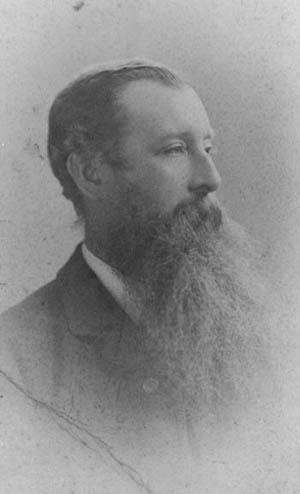Henry Augustus Paynter
1846 - 1919
Notes: The inter-relationship between the Newmans and Paynters
was quite long and complex. I summarise it as follows:
- The link between the families began in 1867 when Edwin
Newman's only daughter Henrietta married
Henry Paynter in London in 1867. Ray Farnsworth records that their marriage
certificate shows Henry's address as St. Paul's Alnwick, so he must have moved
up there before the wedding. It remains a mystery why he chose to work (or
was sent to work) so far from his ancestral home in Cornwall.
- Henrietta's mother was Charlotte (nee Jekyll), first
wife of Edwin Newman, who died in
1876. Edwin subsequently married Henry's mother, Catherine
Augusta (nee Coleman). Thus Henry Paynter became both Edwin Newman's step-son
and son-in-law!
- In the late 1870s, Henry's brother James
Bernard Paynter joined Edwin's law firm, becoming
a partner in 1881. On Edwin's death, he became senior partner in the firm
buying Hendford Manor from Edwin's estate.
- The connection between the families continued for another generation when
Henrietta's nephew Walter Ernest Newman
(my grandfather) married his first cousin, Henry's favourite daughterLilian
Jekyll Paynter.
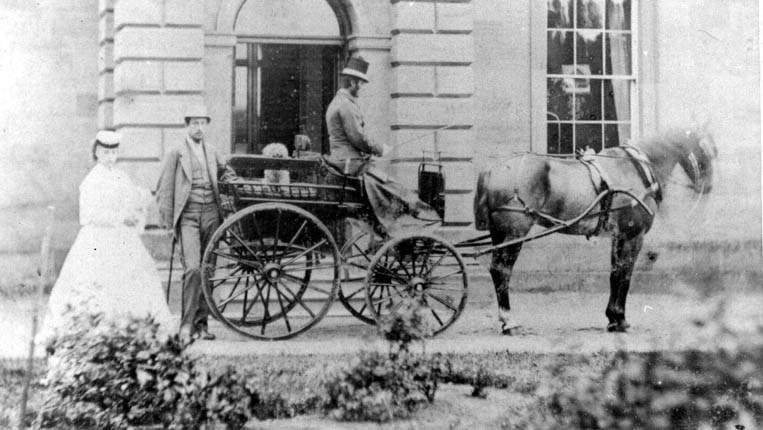
Henry and Henrietta at Freelands in their younger days
Outline his Life: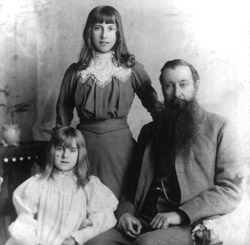
The 1861 census shows Henry (aged
15) at boarding school in Truro with his brothers John de Cambourne (16) and
Charles (18). Beyond that, I know nothing of Henry's early life, but it seems
that he was sent off to Alnwick in Northumberland to work in a law firm owned
by a Mr Foster. Then in April 1867, at the age of 20, he married Edwin Newman's
only daughter Henrietta (aged 17). After
the wedding, the couple travelled back to Northumberland where Henrietta gave
birth to her first baby Kate in the coastal village of Almouth in early February
1868. Later that year (in October 1868) Edwin Newman travelled up to Alnwick
where he bought the house Freelands and settled the young couple in it.
At some stage Henry entered into a partnership with Foster, the firm Forster
and Paynter being located in the town centre of Alnwick (see separate
page). Henry and Henrietta lived at Freelands where they spent the rest
of their married life (45 years) and produced 12 children over a period of 32
years. Over the years, Henry established himself amongst the local gentlefolk
and became well known in the district - he and his brother John
de Cambourne Paynter, who subsequently joined the law firm and lived at
the nearby Belvedere, being known for their long beards.
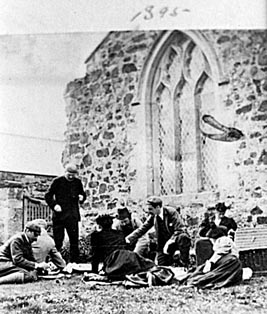 Henry's interests extended well beyond legal affairs, and
he developed a keen interest in shooting and fishing, golf and other outdoor
pursuits. It seems he had a passionate interest in wild bird life, and was involved
in the bird sanctuary on the Farne Islands, where the family would visit when
on holidays (photo left). Henry also had a financial interest (and directorship
- see photo below) in a local colliery in
the nearby village of Shilbottle where he used to walk each Sunday to read the
lesson in the local church.
Henry's interests extended well beyond legal affairs, and
he developed a keen interest in shooting and fishing, golf and other outdoor
pursuits. It seems he had a passionate interest in wild bird life, and was involved
in the bird sanctuary on the Farne Islands, where the family would visit when
on holidays (photo left). Henry also had a financial interest (and directorship
- see photo below) in a local colliery in
the nearby village of Shilbottle where he used to walk each Sunday to read the
lesson in the local church.
For all the 50 years that he lived at Freelands, Henry never owned the house.
On his death, Edwin Newman placed it in trust for Henrietta for the duration
of her life. This I believe, caused minor embarrassment when he tried to sell
off part of the land and it was discovered that it was not his to sell.
Ray Farnsworth (who lived at Freelands for many years) told me that Henry stayed
on at Freelands four about four years after Henrietta's death in 1914. Ray thinks
that his (only) unmarried daughter, Eva, stayed on with him, after which the
house and land was sold to Capt Gray (Merchant Mariner) in 1918 for £3000.
Henry then moved back south and died in Somerset in 1919 while staying with
his brother James back at Edwin Newman's old home in Yeovil (see below).
Marion Paynter told me (in 2001) that
Henry's sons Ernest and Jum trained as lawyers but were made to work for their
father for nothing. They eventually revolted and "fled to freedom"
in Canada. She added that according to Jum, Henry and Henrietta argued incessently
about money - and that suitors visiting the girls had no idea of the parlous
state of the family's finances. Henrietta never had enough money for housekeeping
or for the entertaining that they indulged in, nor for the charities that she
supported.
Edith has a lot to say about her father in
her wonderfully colourful reminiscences of her childhood which she wrote late
in life in 1974 . These are reproduced at the bottom of her page.
My father, H.E.M. Newman was a little less flattering
in his "Reminiscences"
about his visits to Freelands in the years up to 1908:
"My grandfather stood six foot three inches in his socks, sporting
a huge spade beard which repelled me at the good-night kiss, smelling as it
did of whisky and tobacco. He was a strange character. Years later when I was
grown up, my father told me that he was a master of sarcasm such as to drive
his largely uneducated sons from the home at the first opportunity, whereas
on the other hand, his popularity with and hospitality to his elders and contemporaries
prompted so many legacies that he should have died rich had he not been profligate
and seldom out of debt. That is as may be. The Duke (of Northumberland) was
among his clients and he thus enjoyed some privileges including access to fishing
and shooting rights, sports at which he was notable proficient. He also enjoyed
the keys to Alnwich Park ...."
He goes on to describe Sunday hypocracies: "On the Sabbath, Day thou
shalt do no manner of work ... thy manservant, nor thy maidservant not thy cattle
etc. I can vouch that the maidservants toiled, but the cattle here included
horses and ponies and they were strictly protected from Sabbath labour. .....
In parenthesis, I also learned that Henry Paynter crowned his Sunday austerity
after supper with three or more male cronies in the smoking room at a whisky
and whist session. (He kept a chamber pot behind a folding screen, not to mention
two spittoons on the floor. That I do remember)".
Ian Caldwell writes a similar
story about Henry as follows: "Henry Augustus Paynter (1846-16/5/1919),
son of Francis Paynter and Catherine Augusta Coleman, married Henrietta Newman
(d.1914) on 11th April 1867 at St.George's Church, Hanover Square and they had
12 children, 8 girls and 4 boys. Henry was born on 2nd April 1846, probably
in Marazion, Cornwall. Henry practiced as a solicitor in Alnwick, one of his
clients being the Duke of Northumberland who allowed the family the use of his
grounds as he had given them a key to the gate. The Percy Hunt would meet in
front of Henry¹s house, Freelands, and my grandmother enjoyed following
the hunt and was delighted when she was given the brush.
Henry had a half share in the Shilbottle
Coalmine. He and his brother, John, both had beards and both liked country
pursuits. At first the family were relatively well off, but Henry stood surety
for a man who defaulted and also lost money which he put up for one of his sons
on a sawmill that burnt down. (See also note below.)
With twelve children to support the families fortunes declined. Henrietta
was concerned for the poor and produced coins for "penny Dinners"
which were distributed to those in need. They could be redeemed for food at
Alnwick Cocoa Rooms. She also rented a house in Alnmouth to be used as a Fisherman¹s
rest, where fishermen away from home could have a comfortable refuge and some
family furniture and the billiard table were sent down to Alnmouth for these
men - (my grandmother regretted the billiard table going). Henry died on 16th
May 1919 and was buried at Lufton, Somerset. His mother, Catherine, married
his wife's father, Edwin Newman, after their spouses had both died, in 1876,
which was how his brother, Bernard, came to inherit Hendford Manor.
The children were Katie (1868-1953); Henry Ernest (16/6/1869-1958);William
Foster (8/10/1870- d.at sea, Cumeria,1888); Frederick George(31/1/1872-17/1/1945);
Lilian Jekyll(9/11/1873-1958); Evelyn Josephine (1/9/1876-?);Winifred (22/9/1878-1943);
Edwin Coleman (Jum) (8/6/1881-1958); Violet (30/8/1883-7/5/1963); Rose (17/5/1885-17/2/1930);
Edith May (21/5/1889-1982); Olive Daisy Stackhouse (20/101893-?)
Ray Farnsworth, who lives at Freelands, Alnwick, now has a web site for
the history of his house at www.freelandsalnwick.com - and Lilian¹s grandson,
Chris Newman, who lives in Beijing, has a website for the Newman family. (Lily
married her cousin, Walter Newman) and Chris's site is http://newman-family-tree.8k.com/.
In June 2015, further information was
provided by Ian Caldwell regarding Henry's sawmill investment. Ian quoted from
the London Gazette of June 1st 1886, page 2654 as follows:
"Notice is hereby given, that the Partnership heretofore subsisting
between us the undersigned, Alfred Oswald and Henry Augustus Paynter, carrying
on business as Timer Merchants and Saw Mill Proprietors, at Pallion Saw Mills,
near Sunderland, in the County of Durham, undert the styles of Alfred Oswald
and A. Oswald & Co., has been dissolved, by mutual consent as to and from
the day of the date hereof. All debts due to and owing by the said late partnership
will be received and paid by the said Henry Augustus Paynter, who will continue
the business. Dated this 22nd May, 1886.
Alfd. Oswald, Hy. A. Paynter"
Ray Farnsworth wrote, "I
stumbled on a bit of interesting nonsense while browsing through an 1890 Edition
of a Northumberland Directory. I easily found a reference to Henry Augustus
Paynter as A Solicitor of Forster & Paynter of Fenkle Street, Alnwick. (this
building also has an entrance in The Market Place.. I also found him as proprietor,
'Garwood and Paynter', of the Shilbottle Coal Co. He is also listed as "Steward
to the Courts Baron of Wark and Wooler".
The Courts Baron were an ancient, mediaeval feature and, although essentially
not in use by 1890, were held probably a couple of times a year to deal with
petty matters of Debt etc. The Steward would hold the Court for the Lord of
the Manor (i.e. the Duke of Northumberland). By 1890, the Steward would normally
be a Solicitor."
Somerset Country Council sent me the following notes about Henry in response
to my request for information about him:-
"Lufton is a small Somerset parish about three miles west of Yeovil. According
to the Western Gazette of 30th May 1919 (Yeovil edition, p 4), Henry Augustus
Paynter was on a visit to his brother, James Bernard Paynter of Hendford Manor,
Yeovil, when he died aged 73. The obituary stated that Henry Augustus was 'a
solicitor with a large practice, but was also prominent in the hunting field,
a regular golfer and an expert angler. He took a keen interest in the protection
of wild birds and established an extensive bird sanctuary on the Farne Islands
(off Northumberland) which he was lessee. He was part owner of the large Shilbottle
collieries, but had recently sold his interest in that undertaking'. It
seems likely that he was born in Penzance, Cornwall".
When I visited Lufton in 2001, the weather was bad and darkness was approaching,
and I was unable to find the church where Henry is buried. The map below shows
it at on a small dead-end road close by the A3088 road just outside Yeovil.
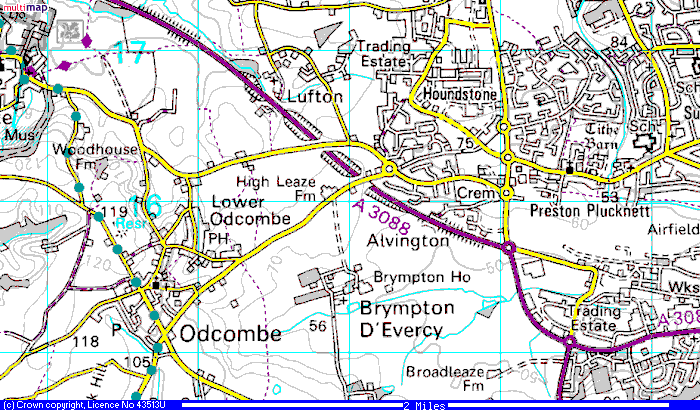
Five of the Paynter brothers can be seen in the photo below, taken at Freelands
in 1875. James Bernard (back right), Henry (next to James), John de Cambourne
(back left), Francis Edward (next to John), and Rev Beville (seated, middle
row).
(Note I'm not convinced that all the names quoted are correct - see comments
under Francis Edward Paynter's page)
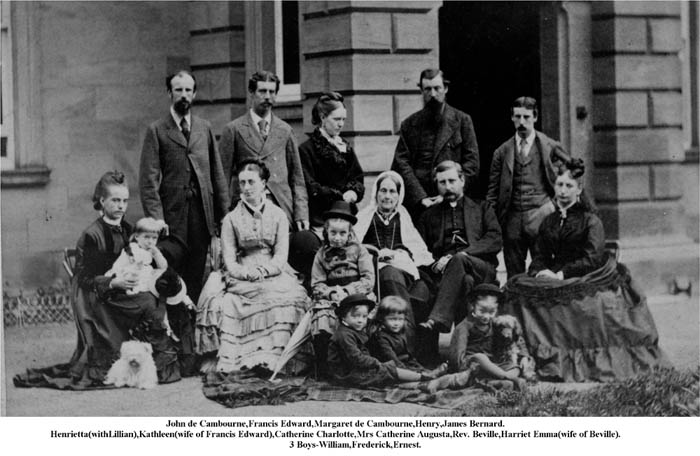
Below is a montage of the Shilbottle Coal
Mine officials dated 1912, sent to me by Ian Caldwell on 5th March 2008. The
photo was given to him by his aunt Betty
Ross. For a larger image of the photo, click here.
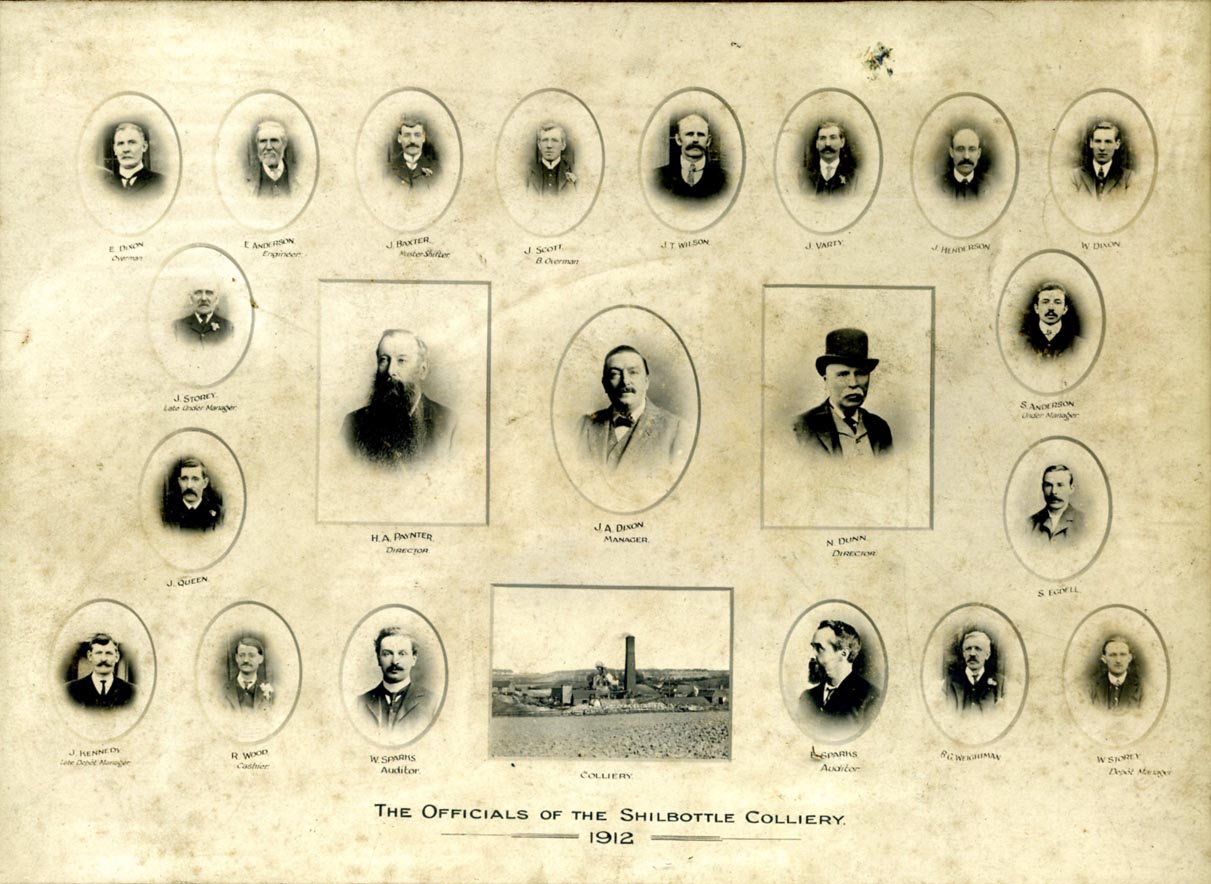
Last updated: 5th Aug 2013 - detailed corrections
including deletion of reference to Francis Paynter once being a partner of
Edwin Newman.
Updated: 5th May 2008 - photo of Shilbottle officials added.
Previous updated: 10th July 2005 - references added to Henry and
Henrietta's marriage certificate (see email from Ray Farnsworth dated 9th
July 2005)
